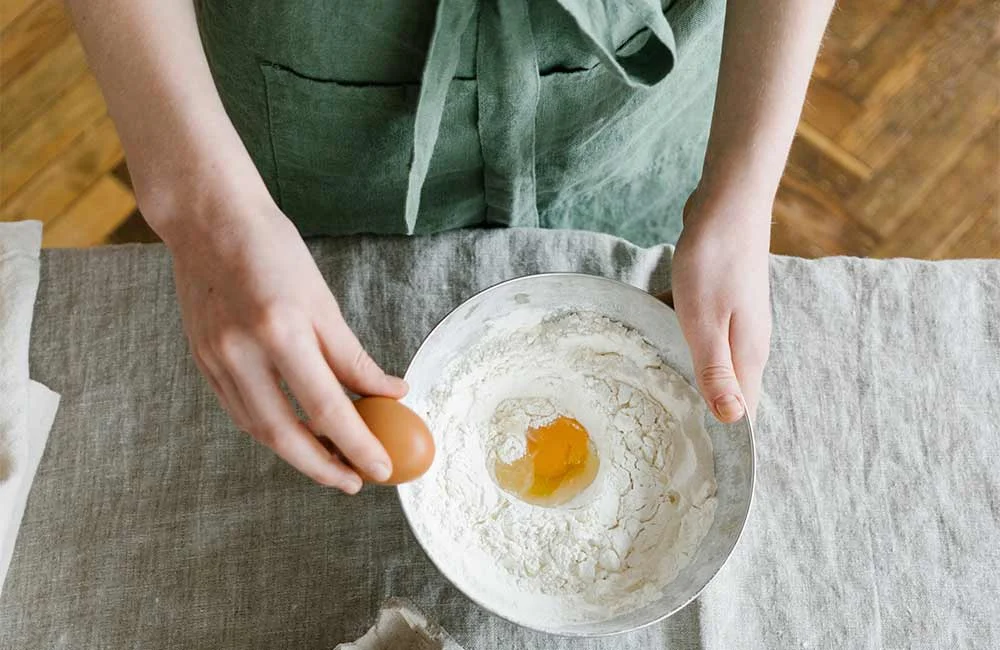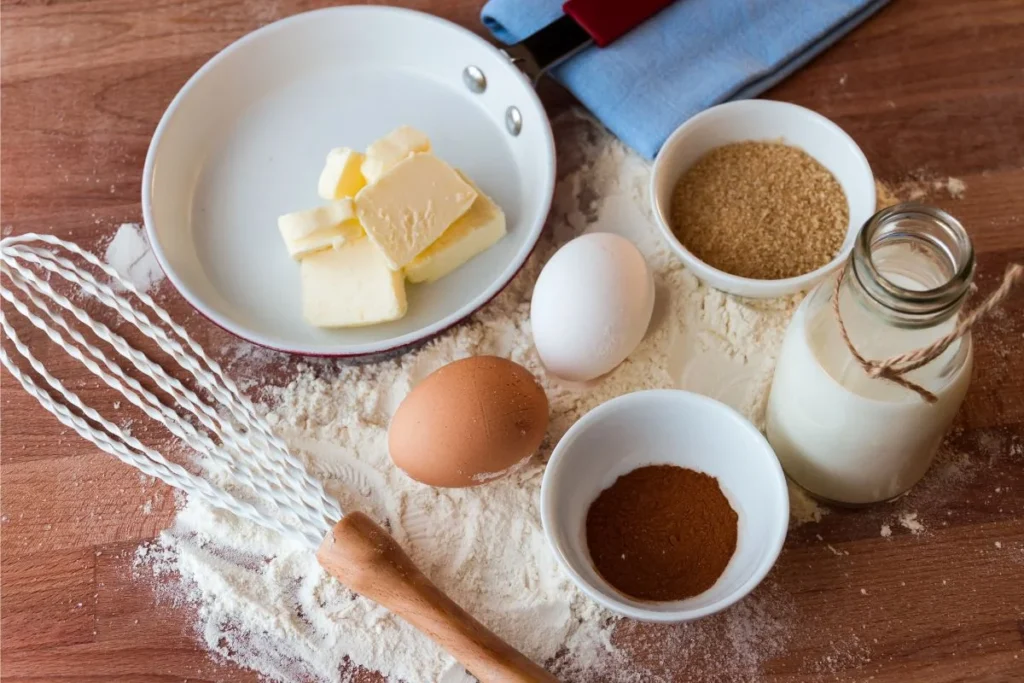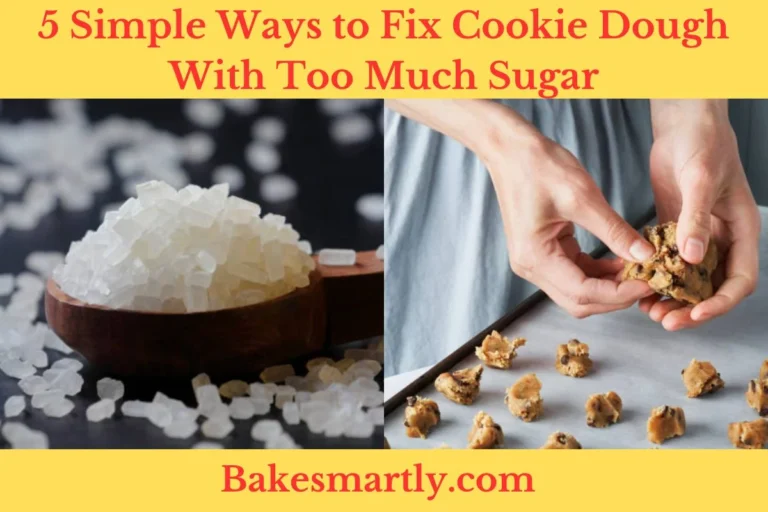
Eggy Cake: Why Does My Cake Smell and Taste Like Eggs?
There’s nothing more frustrating than spending hours in the kitchen preparing a delicious cake, only to have it come out with a strong smell and taste of eggs. If this has ever happened to you, don’t worry, you’re not alone. This common baking mishap can be caused by a variety of factors, from overbeating the eggs to using old or spoiled ingredients.
But what exactly is it about eggs that can cause such a pungent smell and taste in your cake? The science behind eggy cake is a fascinating topic that delves into the chemical reactions that occur during the baking process.
In this article, we will explore the reasons behind this phenomenon and provide some tips on how to fix it so that you can enjoy perfectly baked, egg-free cakes every time. So, let’s get started and uncover the secrets of non-eggy cake!
Table of Contents
ToggleThe Science Behind Eggs and Baking
Eggs are a crucial ingredient in many baking recipes. They provide structure, help to leaven the cake and add moisture. The egg white, or albumen, is made up of water and protein molecules that can be easily denatured by heat. When you beat egg whites, you incorporate air into the mixture, which helps to create a light and fluffy texture in your cake.
However, if you overbeat the eggs, the protein molecules will become too tightly coiled, resulting in a dense and rubbery cake. Additionally, if you add too many eggs to your batter, the cake will have an overpowering eggy taste.
Why Do Some Cake Recipes Call for Eggs?
Most cake recipes call for eggs because they are essential for creating the structure and texture of the cake. Eggs are also good emulsifiers, meaning they can help to blend the ingredients together.
In addition to contributing to the texture of the cake, eggs also play a crucial role in its flavor. The yolk contains fat, which adds richness to the cake. The protein in the yolk also contributes to the structure of the cake, helping it to hold its shape.
Reasons Behind Eggy Cake
Several factors contribute to the development of an eggy cake. Let’s explore them in detail:
- Excess Eggs: Using too many eggs in a cake recipe can result in an overpowering egg flavor. The eggs not only add moisture and structure but also contribute to the taste. However, if the ratio of eggs to other ingredients is too high, the egg flavor becomes more pronounced, leading to an eggy cake.
- Insufficient Mixing: Inadequate mixing can also contribute to an eggy cake. When the cake batter is not mixed thoroughly, the eggs may not be evenly distributed, resulting in concentrated pockets of egg flavor. It’s crucial to follow the recipe instructions and mix the ingredients well to achieve a balanced distribution of flavors.
- Incorrect Oven Temperature: The oven temperature plays a crucial role in the baking process. If the oven temperature is too low, the cake may take longer to bake, allowing the eggs to release more flavor and intensify the eggy taste. On the other hand, if the oven temperature is too high, the cake may cook too quickly, resulting in an uneven texture and a more pronounced egg flavor.

3 Techniques to Fix Eggy Cake
Fortunately, there are effective techniques to fix an eggy cake and restore its deliciousness. Consider the following methods:
- Adjusting Ingredient Ratios: To reduce the eggy taste in your cake, you can adjust the ingredient ratios. Decrease the number of eggs slightly and compensate for the lost moisture by adding a bit more liquid, such as milk or buttermilk. This adjustment helps achieve a better balance of flavors while maintaining the desired texture.
- Enhancing Mixing Techniques: Proper mixing is essential for achieving a well-balanced cake. Ensure that you mix the ingredients thoroughly according to the recipe instructions. Pay extra attention to incorporating the eggs evenly into the batter, avoiding any pockets that may result in a concentrated eggy flavor. Taking your time during this step will greatly improve the overall taste of the cake.
- Controlling Oven Temperature: Maintaining the correct oven temperature is crucial for baking a delicious cake. Invest in an oven thermometer to ensure accuracy. If your cake consistently turns out eggy, try lowering the oven temperature slightly and increasing the baking time. This adjustment allows the cake to be baked more evenly, reducing the concentration of egg flavor.
How Does the Amount of Eggs Affect the Taste of Cake?
While eggs are an essential ingredient in cakes, using too many can result in an overpowering eggy taste. The number of eggs required in a recipe will depend on the type of cake you are making and the other ingredients used.
For example, sponge cakes typically require a higher ratio of eggs to flour than other cake types. This is because sponge cakes rely on the air incorporated into the beaten eggs to create their light and fluffy texture. However, if you add too many eggs to a sponge cake, it will have a dense and rubbery texture and an overpowering eggy taste.
The Role of Baking Powder in Cake Recipes
Baking powder is another essential ingredient in many cake recipes. It is a leavening agent that helps to create a light and fluffy texture in your cake. Baking powder contains baking soda, cream of tartar, and cornstarch.
When baking powder is mixed with liquid, it releases carbon dioxide gas, which causes the cake to rise. If you use too much baking powder, the cake will rise too quickly, resulting in a collapsed, dense texture.
Additionally, using too much baking powder can also contribute to an eggy taste in your cake.
Other Factors That Can Contribute to an Eggy Taste in Cake
While overbeating the eggs and using too many eggs can result in an eggy taste in your cake, there are other factors to consider. One of the most common factors is using old or spoiled ingredients. If your eggs or other ingredients are past their expiration date or are spoiled, they can contribute to an off-flavor in your cake.
Another factor to consider is the type of flour used. Cake flour is typically used in cake recipes because it has a lower protein content than all-purpose flour. This lower protein content helps to create a tender and delicate texture in the cake.
If you use all-purpose flour instead of cake flour, the cake may have a denser texture and an eggy taste.
Tips for Avoiding an Eggy Taste in Cake
To avoid an eggy taste in your cake, there are several things you can do.
- First, make sure to beat the eggs just until they are incorporated into the batter. Overbeating the eggs can result in a dense and rubbery cake with an overpowering eggy taste.
- Second, make sure to use fresh ingredients, including eggs, flour, and baking powder. If your ingredients are old or spoiled, they can contribute to an off-flavor in your cake.
- Third, make sure to follow the recipe closely and use the correct amount of eggs. If the recipe calls for two eggs, don’t add three. The recipe has been carefully developed to create the perfect balance of flavors and textures.
Common Mistakes in Cake Baking That Can Lead to an Eggy Taste
In addition to the factors mentioned above, several common mistakes can lead to an eggy taste in your cake.
One of the most common mistakes is overbaking the cake. If you leave the cake in the oven for too long, it can become dry and dense, with an overpowering eggy taste.
Another common mistake is not creaming the butter and sugar properly. Creaming the butter and sugar together helps to create air pockets in the batter, which contributes to a light and fluffy texture in the cake.
If you don’t cream the butter and sugar properly, the cake may have a dense texture and an eggy taste.

Egg Substitutes for Baking
If you’re looking to avoid eggs in your baking, there are several egg substitutes you can use.
- One of the most common substitutes is applesauce. Applesauce can be used in place of eggs in recipes that call for one or two eggs.
- Another common substitute is mashed bananas. Mashed bananas can be used in recipes that call for one or two eggs and can add a subtle banana flavor to your cake.
- Other egg substitutes include silken tofu, yogurt, and buttermilk. It’s essential to note that using an egg substitute may change the texture and flavor of your cake, so it’s best to experiment with small batches before making a larger cake.
How to Get Rid of Egg Taste in Cakes After Baking
If you’ve already baked a cake and it has an unpleasant eggy taste, there are still a few things you can do to mitigate the flavor:
- Brush the cake with a flavored syrup: Prepare a simple syrup by combining equal parts water and sugar, and flavor it with extracts like vanilla or citrus. Brush the syrup onto the cake while it’s still warm, allowing it to soak into the layers. The added flavors will help mask the eggy taste.
- Frost the cake with a flavorful frosting: Choose a frosting that complements the cake’s flavor and apply a generous layer on top. The sweetness and additional flavors of the frosting can help balance out the eggy taste.
- Serve the cake with accompanying flavors: Pair the eggy cake slices with sauces, fruit compotes, or whipped cream. These accompaniments will provide contrasting flavors that can help offset the eggy taste and create a more enjoyable eating experience.
Conclusion: Achieving the Perfect Cake Without the Eggy Taste
In conclusion, the science behind eggs and baking is a fascinating topic that can help you to create the perfect cake every time.
By understanding the role of eggs in cake recipes and the chemical reactions that occur during the baking process, you can avoid the common mistake of an eggy taste in your cake.
Remember to use fresh ingredients, beat the eggs just until they are incorporated, and follow the recipe closely. If you’re looking to avoid eggs in your baking, there are several egg substitutes you can use, but it’s essential to experiment with small batches before making a larger cake.
With these tips in mind, you can achieve the perfect cake without the overpowering taste of eggs.
Lindsey Mackenzie
About me
Hi there! I’m Lindsey Mackenzie, the founder of Bake Smartly. Baking has been my passion since childhood, growing up in my father’s bakery. With Bake Smartly, I’m excited to share my love for all things sweet and savory. Join me on this delicious journey as we whip up scrumptious treats and sprinkle joy into every bite!






